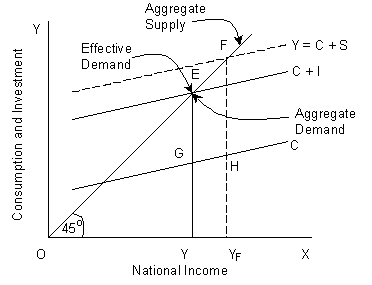Factors Determining the National Income
According to Keynes there are two major factors that determine the national income of an economy −
Aggregate Supply
Aggregate supply comprises of consumer goods as well as producer goods. It is defined as total value of goods and services produced and supplied at a particular point of time. When goods and services produced at a particular point of time is multiplied by the respective prices of goods and services, it helps us in getting the total value of the national output. The formula for determining the aggregate national income is follows −
Aggregate Income = Consumption(C) + Saving (S)
Few factor prices such as wages, rents are rigid in the short run. When demand in an economy increases, firms also tend to increase production to some extent. However, along with the production, some factor prices and the amount of inputs needed to increase production also increase.
Aggregate Demand
Aggregate demand is the effective aggregate expenditure of an economy in a particular time period. It is the effective demand which is equal to the actual expenditure. Aggregate demand involves concepts namely aggregate demand for consumer goods and aggregate demand for capital goods. Aggregate demand can be represented by the following formula −
AD = C + I
As per Keynes theory of nation income, investment (I) remains constant throughout, while consumption (C) keeps changing, and thus consumption is the major determinant of income.


